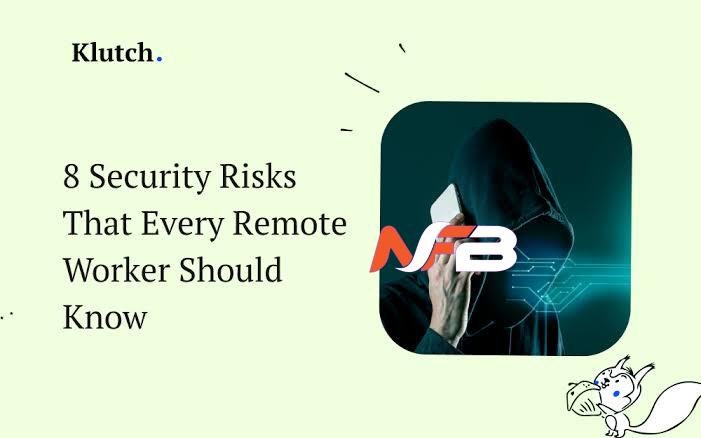Besides emotional and financial intelligence, our education institutes may fall short of teaching us about online risks. By learning from the errors that we make, it may help us get wiser. However, we can still learn without making blunders if we’re careful and attentive.
Remote work around the world is in full bloom. Posing cost-saving opportunities for organizations and the comfort of working from home to employees, remote work has uncountable advantages. However, remote work isn’t a walk in the park. With so many threats roving on the internet, remote workers can’t let their guard down. Still, some remote workers may fall prey to online menace, they’re totally unaware of.
We’re going to highlight the three most dangerous, yet common mistakes that remote workers make, consciously or unconsciously, make while comfortably working from their couches, so that you refrain from making them.
Without further ado, let’s get started.
Unsecured Networks
Phishing Attacks
Unsafe Practices
Bottom Line
Unsecured Networks:
To think that not sharing our home Wi-Fi with our neighbors will keep us safe is a vain desire. Even if we’re not sharing it with anyone, it may not be as safe as you think.
Most people are unaware of Domain Name Server (DNS). Hackers can easily hijack your Wi-Fi router using this technique.
The way out?
Simply use a virtual private network (VPN). When the VPN is enabled, your device’s activity becomes invisible to any ISP you’re connected to. A VPN changes your IP address, masking your online identity that hackers don’t know of. By creating point-to-point encryption between the device and the VPN’s server, you can easily send or receive data without worry in the world.
That said, a VPN cannot protect you from malware and bugs on the internet. Any download you make, a bug may glide into your system and compromise the stored data. However, this problem can be solved too.
All you need is to strengthen your firewall security. A firewall is the first line of defense in detecting viruses. Whenever your device gets an update, it may add security patches too, empowering the firewall security and bridging the loopholes that existed in the previous version.
More importantly, the ISP you’re using also has a role to play in strengthening the firewall security. Vigilantly inspecting the data packets leaving or entering your device, an ISP firewall can locate and block suspicious things trying to make it into your device.
Another serious mistake most remote workers make is connecting their devices to public Wi-Fi. Seemingly a benefit for the masses, public Wi-Fi is home to uncountable bugs and viruses. For remote workers, it’s best to avoid connecting a work device to a public W-Fi at all costs.
However, considering all the problems above, Xfinity is the best option that one can find to keep themselves safe. Apart from their lightning-quick internet, Xfinity doesn’t charge a penny for providing a top-notch Norton’s Security Online VPN. It has a multi-layer firewall security, that keeps bugs, malware, and viruses at a distance.
Addressing the public Wi-Fi issue, Xfinity is providing millions of free hotspot zones around the country, secured with WPA2 encryption, that prevents any malicious actor from entering our device, that too, without an additional cost. Satisfactory enough? Call numero de Xfinity right now to learn more about Xfinity’s plans and packages.
Phishing Attacks:
To steal data and information, scammers may try to gain control over your system to access your personal details, important passwords, credit card details, work files, or anything not intended to be shared with anyone.
A normal practice of such hackers is to install malware, bugs, or a malicious file in the targeted system. Once done, the user may not know about its existence.
In particular, remote workers should pay attention to emails they receive from unknown sources. The best practice is not to open emails at all that come from an unfamiliar source. Simply by opening the email, some advanced malware may enter your system. Some may need you to click on the link given in the email to access your system. Just to be on the safe side, don’t open them at all and report to the concerned department as soon as you see them.
Unsafe Practices:
Sometimes, hackers get lucky when you crawl yourself into their hands. Some employees, even if they’re well-equipped by their organizations, prefer personal devices to work. It may be a comfortable practice for them; however, it is highly dangerous and attracts a lot of cyber threats.
Usually, office devices such as laptops or cell phones are regulated by the organization. They may install the required security patches and features to overcome any cyberattack. This way, such devices are safer to use as compared to our personal devices.
On the other hand, we do all sorts of things on our devices. Open the link without a second thought, download any app without a hitch, and explore whatever we want on the internet. Besides making it quite unsafe for work, our devices are like sitting ducks for hackers to attack. So, work on a device that’s powerful and resourceful enough to ward off any attack that your device isn’t capable of doing.
Bottom Line:
There’s no denying that remote work is fun. You can work from anywhere, without anyone keeping a constant eye on you. However, risks are involved but luckily, now you know how to tackle them. So, be safe and responsible and enjoy working in your comfort, without compromising your online security.













Leave a Reply